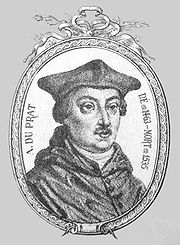
Antoine Duprat
Encyclopedia

Life
Duprat was born in IssoireIssoire
Issoire is a commune in the Puy-de-Dôme department in Auvergne in central France.-Geography:Issoire is located on the Couze River, near its junction with the Allier, SSE of Clermont-Ferrand on the Paris-Lyon-Méditerranée railway to Nîmes...
in Auvergne
Auvergne (province)
Auvergne was a historic province in south central France. It was originally the feudal domain of the Counts of Auvergne. It is now the geographical and cultural area that corresponds to the former province....
. Educated for the law, he won a high position in his profession and in 1507 became first president of the Parlement of Paris (the highest court of France). In 1515 Francis I of France
Francis I of France
Francis I was King of France from 1515 until his death. During his reign, huge cultural changes took place in France and he has been called France's original Renaissance monarch...
made him chancellor of France and prime minister.
In 1517, after his wife's death, he took holy orders
Holy Orders
The term Holy Orders is used by many Christian churches to refer to ordination or to those individuals ordained for a special role or ministry....
and gradually rose in the Catholic Church hierarchy: first as bishop of several dioceses held by him in plurality; then as Archbishop of Sens, 1525; cardinal, 1527, and legate a latere, 1530. Duprat's influence extended much beyond the departments of justice and finance placed under his direct control. French historian Gabriel Hanotaux
Gabriel Hanotaux
Albert Auguste Gabriel Hanotaux, known as Gabriel Hanotaux was a French statesman and historian.-Biography:...
, in the introduction to his Recueil des instructions, calls Duprat
This influence was constantly exerted to strengthen royal absolute power; it was felt in the measures he took against the grands Seigneurs and in his elaborate fiscal system.
Duprat left no writings, but took a leading part in the compilation of the "Coutumes d'Auvergne"; he also did much to encourage the renaissance of letters.
Churchman
Duprat's influence was also manifested, together with his orthodoxy, in those measures which affected the relations of France with the Church, namely, the signing of the Concordat of BolognaConcordat of Bologna
The Concordat of Bologna , marking a stage in the evolution of the Gallican Church, was an agreement between King Francis I of France and Pope Leo X that Francis negotiated in the wake of his victory at Marignano in September 1515...
, and the checking of nascent Protestantism
Protestantism
Protestantism is one of the three major groupings within Christianity. It is a movement that began in Germany in the early 16th century as a reaction against medieval Roman Catholic doctrines and practices, especially in regards to salvation, justification, and ecclesiology.The doctrines of the...
. The Concordat, which Duprat himself negotiated with Pope Leo X
Pope Leo X
Pope Leo X , born Giovanni di Lorenzo de' Medici, was the Pope from 1513 to his death in 1521. He was the last non-priest to be elected Pope. He is known for granting indulgences for those who donated to reconstruct St. Peter's Basilica and his challenging of Martin Luther's 95 Theses...
at Bologna
Bologna
Bologna is the capital city of Emilia-Romagna, in the Po Valley of Northern Italy. The city lies between the Po River and the Apennine Mountains, more specifically, between the Reno River and the Savena River. Bologna is a lively and cosmopolitan Italian college city, with spectacular history,...
, did away with the principles of the "Pragmatic Sanction
Pragmatic sanction
A pragmatic sanction is a sovereign's solemn decree on a matter of primary importance and has the force of fundamental law. In the late history of the Holy Roman Empire it referred more specifically to an edict issued by the Emperor....
"; on the other hand, by causing the appointment of the French hierarchy to rest on royal nomination instead of the old canonical elections, it vested in the civil power an authority over Church affairs.
Duprat's uncompromising attitude towards Protestantism was dictated both by his political sense, as well as his Catholic orthodoxy. The Protestant sympathies of Marguerite d'Angouleme, the Duchesse d'Etampes, and the Minister du Bellay
Jean du Bellay
Jean du Bellay was a French cardinal and diplomat, younger brother of Guillaume du Bellay, and bishop of Bayonne in 1526, member of the privy council in 1530, and bishop of Paris in 1532.-Biography:...
failed to move him. The Sorbonne
Sorbonne
The Sorbonne is an edifice of the Latin Quarter, in Paris, France, which has been the historical house of the former University of Paris...
and the Parlement were instructed to exclude the writings of the innovators; in 1534 the posting of subversive pamphlets at the door of the royal apartments cost the perpetrators their lives.
Despite being archbishop of Sens for several years, the first time he entered the cathedral there was for his own funeral. This shows how he abstained from some of his responsibilities, thus leading us to acknowledge clerical ignorance and absenteeism of the time.

